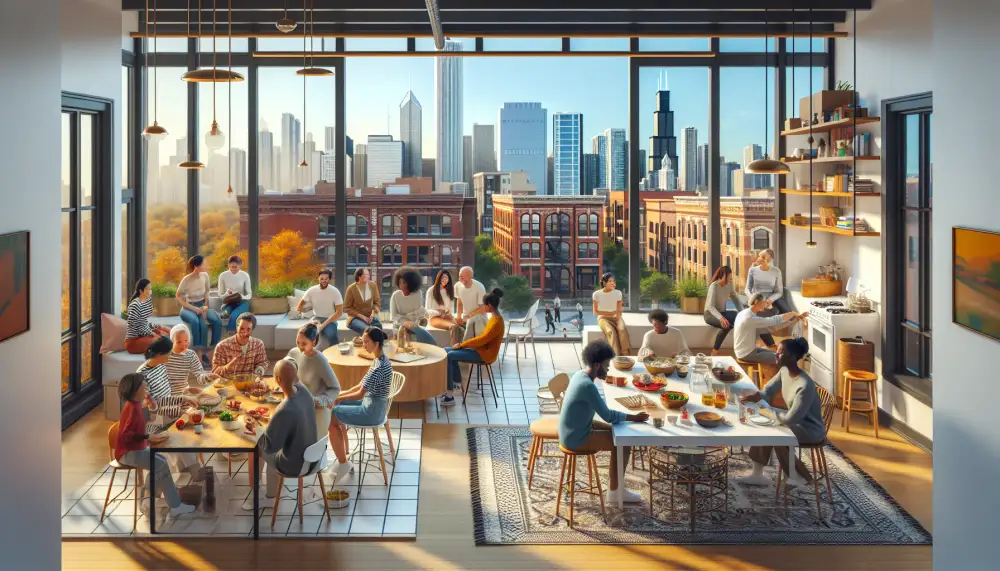Chicago's Communal Living Renaissance: Where City Life Meets Shared Values

Shared Meals and Cooking
Shared meals and cooking are at the heart of many communal living spaces in Chicago. This practice fosters a sense of community and provides an opportunity for residents to connect over delicious food. Many communal living homes in Chicago have large, shared kitchens where residents can cook together, share recipes, and enjoy each other's company. Some houses have designated cooking nights where residents take turns preparing meals for the group. This not only lightens the load of daily cooking but also allows residents to showcase their culinary skills and cultural backgrounds. Potlucks and shared meals are common occurrences, creating a warm and inviting atmosphere for residents to socialize and bond.
Group Activities and Events
Communal living in Chicago often goes beyond sharing a roof. It's about fostering a sense of community and shared experiences. Many communal living spaces in Chicago organize regular group activities and events, creating opportunities for residents to connect, socialize, and build lasting friendships. These can range from casual gatherings like potluck dinners, game nights, and movie screenings to more structured events like workshops, guest speaker series, and volunteer outings.
Some houses have dedicated committees or individuals responsible for planning and organizing these events, ensuring a diverse and engaging calendar throughout the year. These shared experiences contribute significantly to the vibrant and fulfilling lifestyle that draws many to communal living in Chicago. They transform houses from mere dwellings into thriving communities where people feel a sense of belonging and connection.
Shared Responsibilities and Chores
In communal living situations in Chicago, shared responsibilities and chores are vital for a harmonious and functional environment. Whether you're considering a co-living space, cooperative housing, or an intentional community, a clear division of labor is key.
Many communal living spaces in Chicago operate on a rotating chore system. This ensures everyone contributes equally to tasks like cleaning common areas, taking out trash, and grocery shopping. Some communities even have designated cooks for shared meals, further fostering a sense of community.
Open communication is essential when it comes to chores. Regular house meetings allow residents to discuss any issues, adjust schedules, or simply check in with one another. This collaborative approach helps prevent misunderstandings and ensures everyone feels heard.
Remember, communal living thrives on mutual respect and understanding. By embracing shared responsibilities and open communication, residents in Chicago's communal living spaces can create a supportive and fulfilling living experience.

Decision-Making Processes
Choosing the right communal living situation in Chicago requires careful consideration. Start by defining your personal needs and priorities. Consider factors like budget, desired location, preferred community size, and lifestyle preferences. Do you envision yourself in a large, bustling co-living space or a smaller, more intimate house share? Are you comfortable with a structured environment with house rules, or do you prefer a more laid-back atmosphere?
Research different communal living options thoroughly. Explore co-living spaces, cooperative houses, and intentional communities in neighborhoods that align with your lifestyle and commuting needs. Look into the application process, costs, and community guidelines for each potential option. Reach out to current or former residents to gain firsthand insights into the community dynamics and overall living experience. Don't hesitate to ask questions about shared responsibilities, communication norms, and conflict resolution processes.
Ultimately, the best decision comes down to finding a community that aligns with your values, respects your boundaries, and fosters a sense of belonging. Take your time, trust your instincts, and choose a communal living situation in Chicago that feels like the right fit for you.
Privacy and Personal Space
Communal living in Chicago often means navigating shared spaces and close quarters. While this lifestyle offers fantastic opportunities for connection and community, it's essential to establish clear boundaries around privacy and personal space. Before committing to a communal living situation, have open and honest conversations with potential housemates about expectations. Discuss noise levels, guest policies, shared space usage, and personal boundaries. Some houses have quiet hours designated for work or relaxation. Others might have rotating schedules for cooking and cleaning communal areas. Having these conversations early on can prevent misunderstandings and conflicts down the line.
Remember, respecting each other's privacy is paramount. Just because you share a living space doesn't mean you share every aspect of your life. It's perfectly acceptable to set aside time for yourself, whether it's enjoying a quiet cup of coffee in your room or taking a long bath. Open communication is key to a harmonious communal living experience. Don't be afraid to respectfully address any concerns or issues that arise. By establishing clear expectations and maintaining open dialogue, you can create a respectful and fulfilling communal living experience in Chicago.
Guest Policy and Etiquette
Communal living in Chicago often means sharing your space with others, so understanding and respecting the guest policy is crucial for a harmonious living environment. Policies vary between different communal living setups. Some houses may have designated guest rooms available for a small fee, while others might have limits on how long guests can stay or require residents to be present during the visit. Always check with your housemates or property management to avoid any misunderstandings.

Open communication is key in any shared living situation. Before inviting a guest over, inform your housemates, especially if your guest will be using shared spaces like the kitchen or bathroom. Be mindful of noise levels, especially during nighttime hours. If your guest is staying overnight, ensure they are aware of any quiet hours and general house rules.
Remember, being a good host also means being a considerate housemate. By respecting the guest policy and communicating openly, you contribute to a positive and welcoming atmosphere for everyone in your communal living space.
Sustainability Practices
Communal living in Chicago often goes hand-in-hand with a strong emphasis on sustainability. Many communities prioritize reducing their environmental footprint through shared resources and collective action. Here are some common sustainability practices you might find in Chicago's communal living spaces:
- Shared Resources: Using shared laundry facilities, tools, and appliances reduces overall consumption and waste.
- Energy Efficiency: Many communities invest in energy-efficient appliances, utilize solar panels, and practice mindful energy consumption.
- Waste Reduction and Recycling: Composting is common practice, along with diligent recycling programs and efforts to reduce single-use plastics.
- Sustainable Transportation: Many communities are located near public transportation, and some even have shared vehicles or encourage biking.
- Local and Sustainable Food: Community gardens, shared meals featuring locally sourced ingredients, and even in-house composting systems contribute to a lower carbon footprint.
These practices not only benefit the environment but also foster a sense of shared responsibility and community among residents. When you share resources and work together towards sustainability goals, it strengthens the bonds within a communal living environment.
Community Involvement
Communal living in Chicago offers a fantastic way to connect with like-minded individuals while experiencing city life to the fullest. Many intentional communities actively engage in neighborhood initiatives, volunteering, and community events. Residents often find themselves participating in local farmers' markets, park cleanups, and community gardens. This shared commitment to giving back fosters a strong sense of belonging and strengthens the bond between housemates. Moreover, many communal living spaces in Chicago prioritize sustainability. It's common to find houses with composting systems, shared gardens for growing food, and a collective effort to reduce their environmental footprint. This shared commitment to eco-conscious living not only benefits the environment but also creates a unique opportunity for residents to learn from each other and adopt more sustainable lifestyles.

| Communal Living Option | Typical Cost per Month | Typical Lease Length | Amenities Often Included |
|---|---|---|---|
| Coliving Spaces | $1,200 - $2,500 | 3 - 12 months | Utilities, Wi-Fi, furnished spaces, shared kitchens and living areas |
| Cooperative Houses (Co-ops) | $700 - $1,500 | Membership-based (can be indefinite) | Shared responsibilities (e.g., cleaning, cooking), decision-making power within the community |
Challenges and Rewards
Communal living in Chicago, while offering a unique and fulfilling lifestyle, is not without its challenges. Sharing a living space with others requires a high level of communication, compromise, and respect for individual differences. Establishing clear expectations and boundaries from the outset is crucial to avoid conflicts and maintain harmony within the community. Decision-making processes should be transparent and inclusive, ensuring that all members have a voice and feel heard.
Finding the right community that aligns with your values, lifestyle, and personal preferences can also be a challenge. Chicago offers a diverse range of communal living options, from cooperative houses and co-living spaces to eco-villages and intentional communities. Each community has its own unique culture, rules, and expectations, so it's essential to do your research and carefully consider your options before making a commitment.
Despite these challenges, the rewards of communal living in Chicago can be immense. Sharing resources and expenses can lead to significant cost savings, allowing you to live more affordably in one of the nation's most expensive cities. Beyond the financial benefits, communal living fosters a strong sense of community and belonging, providing opportunities for social connection, shared meals, and collaborative activities. It can also promote personal growth, as you learn to navigate shared spaces, communicate effectively, and embrace diverse perspectives.
Finding the Right Community Fit
Chicago, known for its vibrant culture and diverse neighborhoods, offers a unique appeal for those seeking communal living experiences. Finding the right community fit is crucial for a positive and fulfilling co-living experience.

Consider your lifestyle, values, and preferences. Are you seeking a community with a focus on sustainability, social activism, or artistic expression? Chicago boasts a variety of communal living options, each with its own distinct character.
Research different neighborhoods known for their communal living spaces. Explore areas like Pilsen, known for its artistic vibe and cooperative housing options, or Rogers Park, home to intergenerational communities and shared housing initiatives.
Connect with local organizations and online platforms that facilitate communal living in Chicago. Attend meetups, workshops, or virtual events to connect with potential housemates and learn about available spaces.
Communicate openly and honestly with potential housemates about your expectations, boundaries, and shared responsibilities. Compatibility and shared values are essential for a harmonious living environment.
Remember that finding the perfect community fit may take time and effort. Be patient, persistent, and open to exploring different options until you discover the ideal communal living experience that aligns with your aspirations.
Published: 01. 07. 2024
Category: Food



